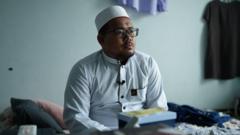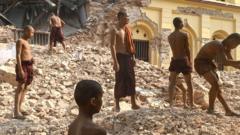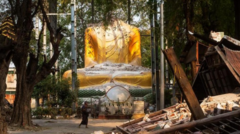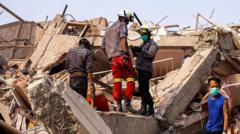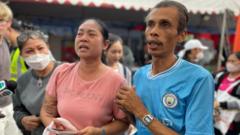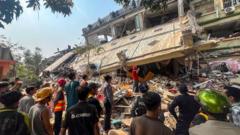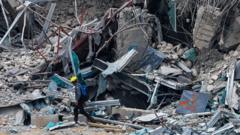Soe Ko Ko Naing, a labour rights activist residing in Thailand, reflects on his loss and the mounting guilt felt by Myanmar expatriates as they grapple with their inability to assist in the wake of the disaster.
Myanmar Earthquake Survivor Shares Guilt and Helplessness from Abroad
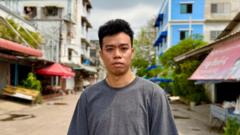
Myanmar Earthquake Survivor Shares Guilt and Helplessness from Abroad
With a devastating earthquake claiming over 2,000 lives, Myanmar's diaspora feels overwhelmed as they watch the disaster unfold.
In the aftermath of a powerful earthquake striking Sagaing, Myanmar, the diaspora community—especially those living in Thailand—grapples with feelings of guilt and helplessness as they witness the devastation from a distance. Soe Ko Ko Naing, who fled Myanmar due to political persecution and now lives in Thailand, is one such individual who has been deeply affected by the tragedy. When he last visited his great-uncle, he had no idea that their next meeting would never happen, as his uncle perished in the quake.
Recalling his connection with his maternal uncle, whom he affectionately called Oo Oo, Ko Naing shared their mutual support for resistance against the military junta in Myanmar. "I feel guilty because our people need us the most now," he expressed. This overwhelming guilt resonates among the approximately 4.3 million Myanmar nationals in Thailand, many of whom face challenges in returning home to aid rescue efforts.
As reports flood in of buildings collapsing and lives lost, those in Thailand's Myanmar migrant community, like factory worker Yin Yin, are heartbroken as they watch news of their homeland, worried for their loved ones. Shopowner Thant Zin echoed similar sentiments, lamenting the loss of historical landmarks and temples deeply rooted in their culture and heritage.
In a tightly-packed street market in Samut Sakhon, one can find traditional Burmese attire and familiar businesses that bring comfort to the expatriate community, yet the air is thick with sorrow over the disaster. Ko Naing recalls feeling the quake's tremors while laying in bed miles away, leading to a frantic search on social media for updates about his family.
The news was a mixed bag—most relatives were safe, but the pain of losing his great-uncle, who was a source of stability and inspiration, weighed heavily on him. "He was the only one I could talk to. I got my resilience from him," Ko Naing said.
His journey to Thailand was fraught with peril, having escaped a regime that sought to arrest him for his activism. He now channels his energy into supporting humanitarian efforts for the earthquake victims while grappling with feelings of depression and helplessness brought on by continuous turmoil in Myanmar. "It's depressing living here, seeing the news about my country," he admitted.
Despite the emotional toll, Ko Naing reminds himself and others in the diaspora that their capacity to help is still alive. By raising funds and sending aid to their homeland, they hope to instigate change and contribute positively amidst overwhelming sorrow. "We have to make up our mind on how to rebuild, how we can move on," he concluded, embodying the spirit of resilience required in trying times.
Recalling his connection with his maternal uncle, whom he affectionately called Oo Oo, Ko Naing shared their mutual support for resistance against the military junta in Myanmar. "I feel guilty because our people need us the most now," he expressed. This overwhelming guilt resonates among the approximately 4.3 million Myanmar nationals in Thailand, many of whom face challenges in returning home to aid rescue efforts.
As reports flood in of buildings collapsing and lives lost, those in Thailand's Myanmar migrant community, like factory worker Yin Yin, are heartbroken as they watch news of their homeland, worried for their loved ones. Shopowner Thant Zin echoed similar sentiments, lamenting the loss of historical landmarks and temples deeply rooted in their culture and heritage.
In a tightly-packed street market in Samut Sakhon, one can find traditional Burmese attire and familiar businesses that bring comfort to the expatriate community, yet the air is thick with sorrow over the disaster. Ko Naing recalls feeling the quake's tremors while laying in bed miles away, leading to a frantic search on social media for updates about his family.
The news was a mixed bag—most relatives were safe, but the pain of losing his great-uncle, who was a source of stability and inspiration, weighed heavily on him. "He was the only one I could talk to. I got my resilience from him," Ko Naing said.
His journey to Thailand was fraught with peril, having escaped a regime that sought to arrest him for his activism. He now channels his energy into supporting humanitarian efforts for the earthquake victims while grappling with feelings of depression and helplessness brought on by continuous turmoil in Myanmar. "It's depressing living here, seeing the news about my country," he admitted.
Despite the emotional toll, Ko Naing reminds himself and others in the diaspora that their capacity to help is still alive. By raising funds and sending aid to their homeland, they hope to instigate change and contribute positively amidst overwhelming sorrow. "We have to make up our mind on how to rebuild, how we can move on," he concluded, embodying the spirit of resilience required in trying times.

